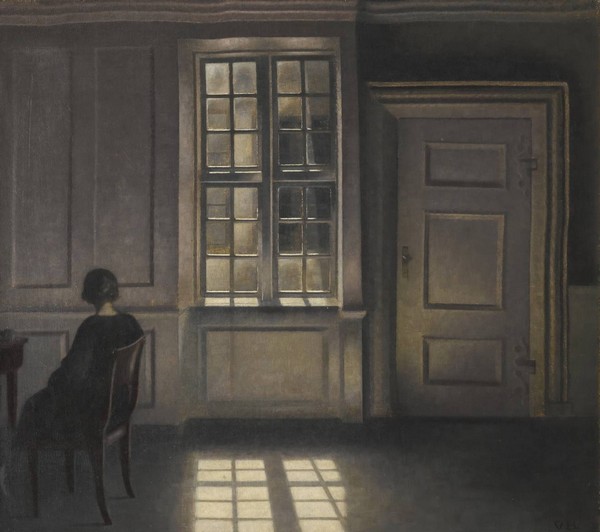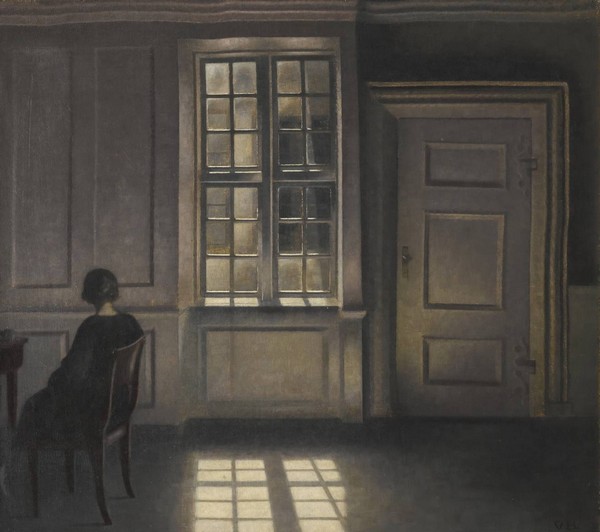
Interior, Strandgade, 30 - V. Hammershoi
"Barbara" is a short story by Joseph Roth whose main character is a young widow with a baby. She devotes herself, body and soul, to bring up her child. She sacrifices the love of her life, Peter; she also sacrifices her health, she literally works herself to death. All in vain, because the child becomes a selfish, lazy young man, unable to show her the slightest affection. When Barbara dies, he's in the room but still, she dies alone, only accompanied by Peter's memory. I'm telling you this because while I was reading this story, it came to mind the last verse of a song by Hanns Eisler "verfehlte Liebe, verfehltes Leben" which could be translated as "wasted love, wasted life."
This song, Verfehlte Liebe, is included in the cycle Sieben Lieder über die Liebe, from 1934, and the poem’s author is Heinrich Heine. At first sight, finding this name among Eisler's work could come as a surprise, as this composer was so committed to his time, but Heinrich Heine’s circumstances were not that different from those of Eisler or Bertolt Brecht, his main poet, although he lived a hundred years before them. Heine’s family was Jewish, he was a socialist who befriended Marx and he lived in exile over the last twenty-five years of his life. His works, some of which had already been banned during his time, were again banned during the Third Reich and one of his sentences became a symbol of the nazi book burning on May 1933: "Where they have burned books, they will end in burning human beings." (Dort, wo man Bücher verbrennt, man am Ende auch Menschen verbrennt.)
The verses from Verfehlte Liebe are the end of Unterwelt, a poem that revolves around the myth of Proserpina who, every year, spends six months in the kingdom of Plato (winter) and six months with her mother Ceres (summer). It appears to be a love story around Unterwelt. Heine, who had been a young romantic, met Mathilde when he was almost forty and lived in Paris. Mathilde was a very young girl, a shop assistant, virtually illiterate, with no interest whatsoever in culture; nothing to do with the intellectual Heinrich Heine. But love is blind; shortly after they had first met, they lived together and he always referred to her as "my wife". A few years later, they got married for practical reasons, so to speak: Heine had been challenged to a duel and wanted Mathilde to be in a safe position if things didn't turn out too well. Fortunately, the duel ended with minor wounds and everyone was able to go on with their lives; Heinrich and Mathilde remained together until his death.
As I said before, it seems that Unterwelt has something to do with Mathilde; the girl spent the summer at her parents’ house and Heine missed her; So that is, Mathilde turned into Proserpina and Heine into the longing Pluto. The meaning of the last verses, which are those that interest us, is not that clear: which life and love is the poet talking about? Some scholars say that Heine held some doubts about his marriage; he was stuck with a woman who, according to his acquaintances, didn't suit him, and he did it just because of his sense of duty. Did he make a mistake? But the verses can also refer to his past life, or to Mathilde's future life... who knows...
The mysterious verses by Heine become a "knocking song" after Eisler’s contribution. Did we ever talk about "knocking songs"? Maybe not. Songs that, most expectantly, hit you hard and let you breathless on your seat. Well, Verfehlte Liebe is one of those songs. You're listening to a nostalgic, charming waltz and suddenly, a curt "your life is a failure" arrives. Just in case it's not quite clear, the second stanza repeats the structure: again the nostalgia and the song ends with the bitter sentence.
We are listening to Verfehlte Liebe performed by Dietrich Fischer-Dieskau and Aribert Reimann.
This song, Verfehlte Liebe, is included in the cycle Sieben Lieder über die Liebe, from 1934, and the poem’s author is Heinrich Heine. At first sight, finding this name among Eisler's work could come as a surprise, as this composer was so committed to his time, but Heinrich Heine’s circumstances were not that different from those of Eisler or Bertolt Brecht, his main poet, although he lived a hundred years before them. Heine’s family was Jewish, he was a socialist who befriended Marx and he lived in exile over the last twenty-five years of his life. His works, some of which had already been banned during his time, were again banned during the Third Reich and one of his sentences became a symbol of the nazi book burning on May 1933: "Where they have burned books, they will end in burning human beings." (Dort, wo man Bücher verbrennt, man am Ende auch Menschen verbrennt.)
The verses from Verfehlte Liebe are the end of Unterwelt, a poem that revolves around the myth of Proserpina who, every year, spends six months in the kingdom of Plato (winter) and six months with her mother Ceres (summer). It appears to be a love story around Unterwelt. Heine, who had been a young romantic, met Mathilde when he was almost forty and lived in Paris. Mathilde was a very young girl, a shop assistant, virtually illiterate, with no interest whatsoever in culture; nothing to do with the intellectual Heinrich Heine. But love is blind; shortly after they had first met, they lived together and he always referred to her as "my wife". A few years later, they got married for practical reasons, so to speak: Heine had been challenged to a duel and wanted Mathilde to be in a safe position if things didn't turn out too well. Fortunately, the duel ended with minor wounds and everyone was able to go on with their lives; Heinrich and Mathilde remained together until his death.
As I said before, it seems that Unterwelt has something to do with Mathilde; the girl spent the summer at her parents’ house and Heine missed her; So that is, Mathilde turned into Proserpina and Heine into the longing Pluto. The meaning of the last verses, which are those that interest us, is not that clear: which life and love is the poet talking about? Some scholars say that Heine held some doubts about his marriage; he was stuck with a woman who, according to his acquaintances, didn't suit him, and he did it just because of his sense of duty. Did he make a mistake? But the verses can also refer to his past life, or to Mathilde's future life... who knows...
The mysterious verses by Heine become a "knocking song" after Eisler’s contribution. Did we ever talk about "knocking songs"? Maybe not. Songs that, most expectantly, hit you hard and let you breathless on your seat. Well, Verfehlte Liebe is one of those songs. You're listening to a nostalgic, charming waltz and suddenly, a curt "your life is a failure" arrives. Just in case it's not quite clear, the second stanza repeats the structure: again the nostalgia and the song ends with the bitter sentence.
We are listening to Verfehlte Liebe performed by Dietrich Fischer-Dieskau and Aribert Reimann.
Verfehlte Liebe
Zuweilen dünkt es mich, als trübe
Geheime Sehnsucht deinen Blick -
Ich kenn es wohl, dein Mißgeschick:
Verfehltes Leben, verfehlte Liebe!
Du nickst so traurig! Wiedergeben
Kann ich dir nicht die Jugendzeit -
Unheilbar ist dein Herzeleid:
Verfehlte Liebe, verfehltes Leben!
At times thy glance appeareth to importune,
As though thou didst some secret longing prove.
Alas! too well I know it, -- thy misfortune
A life frustrated, a frustrated love.
How sad thine eyes are! Yet have I no power
To give thee back thy youth with pleasure rife;
Incurably thy heart must ache each hour
For love frustrated and frustrated life.















Comments powered by CComment